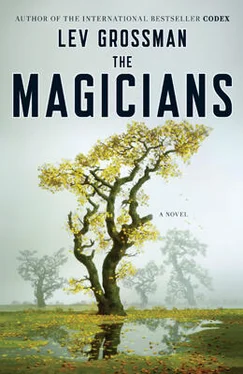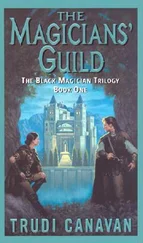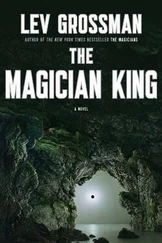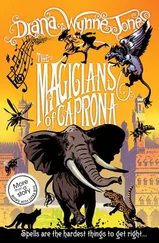In the meantime Quentin also studied the history of magic, about which even magicians knew less than he would have thought. It turned out that magic-users had always lived within mainstream society, but apart from it and largely unknown to it. The towering figures of magical history weren’t famous at all in the mundane world, and the obvious guesses were way off base. Leonardo, Roger Bacon, Nostradamus, John Dee, Newton — sure, all of them were mages of various stripes, but of relatively modest ability. The fact that they were famous in mainstream circles was just a strike against them. By the standards of magical society they’d fallen at the first hurdle: they hadn’t had the basic good sense to keep their shit to themselves.
Quentin’s other homework, Popper’s Practical Exercises for Young Magicians , turned out to be a thin, large-format volume containing a series of hideously complex finger and voice exercises arranged in order of increasing difficulty and painfulness. Much of spellcasting, Quentin gathered, consisted of very precise hand gestures accompanied by incantations to be spoken or chanted or whispered or yelled or sung. Any slight error in the movement or in the incantation would weaken, or negate, or pervert the spell.
This wasn’t Fillory. In each of the Fillory novels one or two of the Chatwin children were always taken under the wing of a kindly Fillorian mentor who taught them a skill or a craft. In The World in the Walls Martin becomes a master horseman and Helen trains as a kind of forest scout; in The Flying Forest Rupert becomes a deadeye archer; in A Secret Sea Fiona trains with a master fencer; and so on. The process of learning is a nonstop orgy of wonderment.
Learning magic was nothing like that. It turned out to be about as tedious as it was possible for the study of powerful and mysterious supernatural forces to be. The same way a verb has to agree with its subject, it turned out, even the simplest spell had to be modified and tweaked and inflected to agree with the time of day, the phase of the moon, the intention and purpose and precise circumstances of its casting, and a hundred other factors, all of which were tabulated in volumes of tables and charts and diagrams printed in microscopic jewel type on huge yellowing elephant-folio pages. And half of each page was taken up with footnotes listing the exceptions and irregularities and special cases, all of which had to be committed to memory, too. Magic was a lot wonkier than Quentin thought it would be.
But there was something else to it, too, something beyond all the practicing and memorizing, beyond the dotted i ’s and crossed t ’s, something that never came up in March’s lectures. Quentin only sensed it, without really being able to talk about it, but there was something else you needed if a spell was going to get any purchase on the world around you. Whenever he tried to think about it he got lost in abstractions. It was something like force of will, a certain intensity of concentration, a clear vision, maybe a dash of artistic brio. If a spell was going to work, then on some gut level you had to mean it.
He couldn’t explain it, but Quentin could tell when it was working. He could sense his words and gestures getting traction on the mysterious magical substrate of the universe. He could feel it physically. His fingertips got warm, and they seemed to leave trails in the air. There was a slight resistance, as if the air were getting viscous around him and pushing back against his hands and even against his lips and tongue. His mind buzzed with a caffeine-cocaine fizz. He was at the heart of a large and powerful system, he was its heart. When it was working, he knew it. And he liked it.
Now that his friends had come back from vacation Eliot sat with them at meals instead. They were a highly visible clique, always earnestly conferring with each other and having fits of obstreperous public laughter, conspicuously fond of themselves and uninterested in the greater Brakebills populace. There was something different about them, though it was hard to say what. They weren’t better-looking or smarter than anybody else. They just seemed to know who they were, and they weren’t constantly looking around at everybody else as if they could tell them.
It rankled the way Eliot had dropped Quentin the minute he ceased to be convenient, but then there were the nineteen other First Years to think of. Though they weren’t a wildly social bunch. They were quiet and intense, always eyeing each other assessingly, as if they were trying to figure out who — if it came right down to it — would take out who in an intellectual death match. They didn’t congregate overmuch — they were always civil but rarely warm. They were used to competing and used to winning. In other words, they were like Quentin, and Quentin wasn’t used to being around people like himself.
The one student he and every other First Year at Brakebills was immediately obsessed with was little Alice, of the tiny glass creature, but it quickly became apparent that in spite of being way ahead of the rest of her year academically she was cripplingly shy, to the point where there wasn’t much point in trying to talk to her. When approached at meals she answered questions in whispered monosyllables, her gaze dropping to the tablecloth in front of her as if weighed down by some infinite inner shame. She was almost pathologically unable to make eye contact, and she had a way of hiding her face behind her hair that made it clear how agonizing it was for her to be the object of human attention.
Quentin wondered who or what could possibly have convinced somebody with such obvious gifts that she should be frightened of other people. He wanted to keep up a proper head of competitive steam, but instead he felt almost protective of her. The one and only time he saw Alice look genuinely happy was when he watched her, alone and momentarily unself-conscious, successfully skip a pebble across the pool in a fountain and between the legs of a stone nymph.
Life at Brakebills had a hushed, formal, almost theatrical tone to it, and at mealtimes formality was elevated to the level of a fetish. Dinners were served promptly at six thirty; latecomers were denied the privilege of a chair and ate standing. Faculty and students sat together at one interminable table that was swathed in a tablecloth of mystical whiteness and laid with heavy-handled silverware that didn’t match. Illumination was provided by battalions of hideous candelabras. The food, contrary to private school tradition, was excellent in an old-fashioned, Frenchified way. Menus tended toward mid-century warhorses like boeuf en daube and lobster thermidor. First Years had the privilege of serving all the other students as waiters, under the stern direction of Chambers, and then eating by themselves when everybody else was done. Third and Fourth Years were allowed one glass of wine with dinner; Fifth Years (or “Finns,” as they were called, for no obvious reason) got two. Oddly enough there were only ten Fourth Years, half the usual number, and nobody would explain why. Asking about it just ended the conversation.
All this Quentin picked up with the speed of a sailor cast away on a savage foreign continent, who has no choice but to learn the local language as rapidly as possible or be devoured by those who speak it. His first two months at Brakebills spun by, and soon red and gold leaves were scattering across the Sea, as if they were being pushed by invisible brooms — which possibly they were? — and the flanks of the slow-moving topiary beasts in the Maze showed streaks of color.
Quentin devoted a half hour every day after class to exploring the campus on foot. One blustery afternoon he stumbled onto a pocket vineyard, a postage stamp of earth ruled into straight lines and planted with rows of grapevines strung up on rusty wires and trained into weird vinicultural candelabra shapes. By now the grapes had already been harvested, and those that hadn’t had shriveled on the vine into tiny fragrant raisins.
Читать дальше












